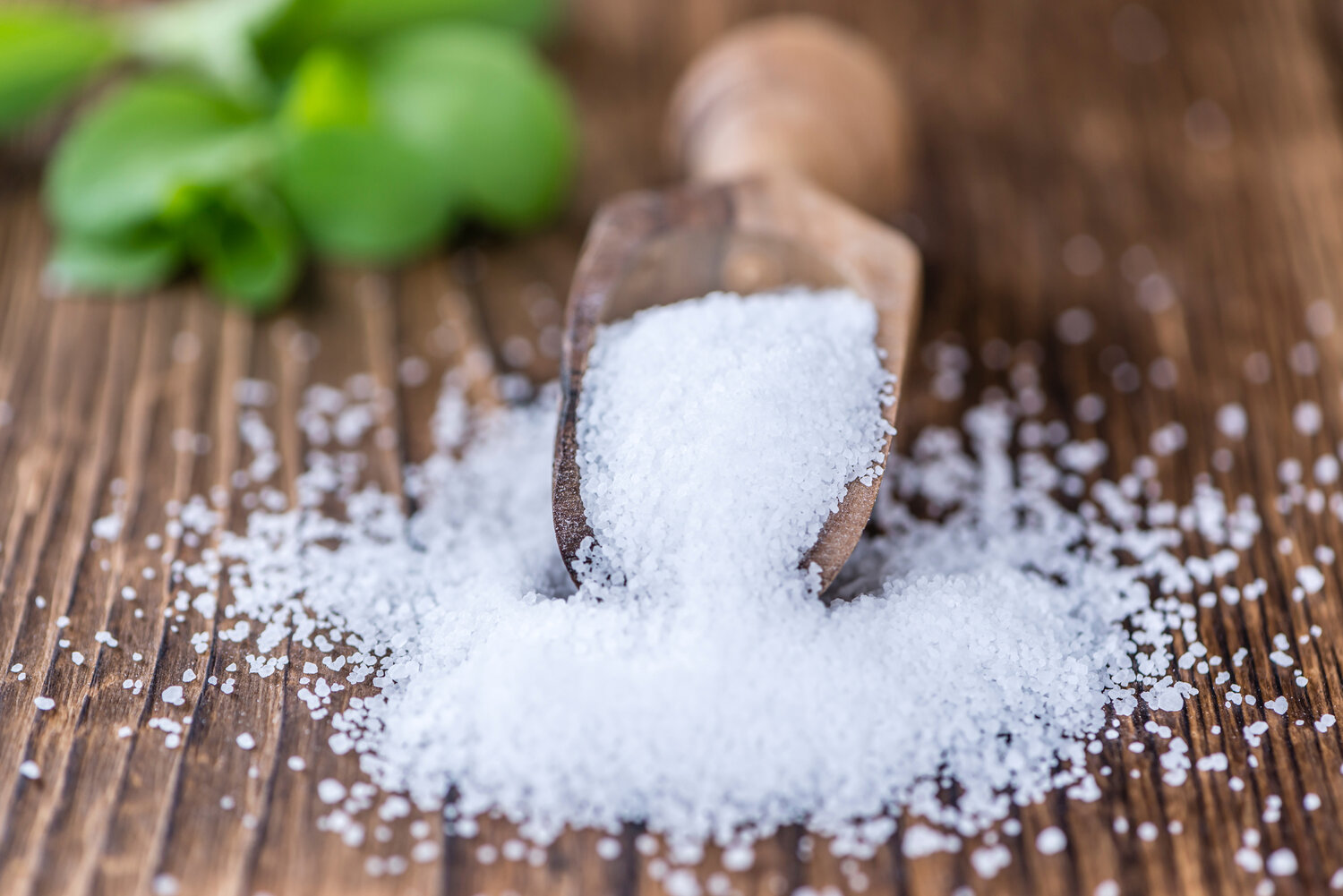A study comparing US household purchases from 2002 to 2018 found that while Americans’ consumption of sugar is declining, the consumption of products containing artificial sweeteners is increasing. This makes sense as excess sugar consumption has been shown to increase likelihood of type 2 diabetes, obesity, and cardiovascular disease. Artificial sweeteners are advertised as a great way to reduce sugar and calorie intake, but are they really all that good for us? My intern Dana and I decided to dive into the research to help answer any questions you may have regarding artificial sweeteners. We will explain what artificial sweeteners are, the different types, their impact on health, and end with our final thoughts.
Artificial Sweeteners – What are they?
Artificial sweeteners, commonly referred to as non-nutritive sweeteners and high-intensity sweeteners are food additives that mimic sugar’s taste without adding significant calories. They are referred to as non-nutritive because they do not contain any vitamins or minerals and are not absorbed well by the body, so provide little to no calories. Artificial sweeteners can range from 100x – 20,000x sweeter than table sugar (sucrose), which means you can get the desired taste using less artificial sweeteners.
Uses for Artificial Sweeteners
Artificial sweeteners are most popular for being used in diet soda and other zero-calorie beverages, but they are used in more products than you may realize. They are used in highly processed foods such as soft drinks, powdered beverages, candy, energy drinks, baked goods, some dairy products, and can even be found in supplements, medications and hygiene products. A good indicator that a product may contain artificial sweeteners is if it’s advertised as “low-calorie” or “sugar-free.” The ingredient list will always indicate if the product contains artificial sweeteners.
Types of Artificial Sweeteners
There are currently eight artificial sweeteners that are approved to be used by the Food and Drug Administration (FDA). It is important to note that the FDA has determined an Acceptable Daily Intake for each of these sweeteners, and the sweeteners are approved under these conditions of use. These include Acesulfame Potassium (Ace-K), Advantame, Aspartame, Neotame, Saccharin, Sucralose, Luo Han Guo fruit extracts (monk fruit), and steviol glycosides. In this section we will briefly review the different artificial sweeteners, as well as sugar alcohols.
Acesulfame Potassium (Ace-K)
-
Common brand names: Sunett® and Sweet One®
-
Sweetness: 200x sweeter than sugar (sucrose)
-
Typically used in frozen desserts, candies, beverages.
Advantame
-
No common brand names
-
Most recent artificial sweetener to be approved by FDA
-
20,000x sweeter than sugar
Aspartame
-
Nutrasweet®, Equal®, Sugar Twin®
-
200x sweeter than sugar (sucrose)
-
Commonly used in diet sodas, chewing gum, frozen desserts
*Phenylalanine is a component of aspartame, so those with Phenylketonuria (PKU) should be aware of that before consumption*
Neotame
-
Common brand names: Newtame®
-
7,000-13,000x sweeter than sugar (sucrose)
-
Commonly used in baked goods, beverages, and candy
Saccharin
-
Common brand names: Sweet and Low®, Sweet Twin®, Sweet’N Low®, Necta Sweet®
-
200-700x sweeter than sugar (sucrose)
-
Commonly used in baked goods, beverages, and candy
Sucralose
-
Common brand names: Splenda®
-
600x sweeter than sugar (sucrose)
-
Commonly used in baked goods, beverages, chewing gum and frozen dairy desserts
Steviol Glycosides
-
Generally Recognized as Safe (GRAS)
-
Commonly known as stevia
-
200-400x sweeter than sugar (sucrose)
Luo Han Guo fruit Extract
-
Generally Recognized as Safe (GRAS)
-
Commonly known as monk fruit extract
-
100-250x sweeter than sugar (sucrose)
Sugar Alcohols
Some common sugar alcohols are xylitol, erythritol, maltitol, sorbitol, and mannitol. Sugar alcohols occur naturally in some fruits and vegetables but can also be manufactured to be used as an artificial sweetener. Sugar alcohols are not considered non-nutritive or high intensity sweeteners. They do provide some calories, although less than that of sugar. Sugar alcohol’s sweetness can range from 25 – 100% of the sweetness of sugar. Sugar alcohols are commonly used in sugar-free gum, candies, and processed snack foods. It is important to note that ingestion of sugar alcohols may cause GI upset.
Artificial Sweeteners Impact on Weight Management
The main benefit of artificial sweeteners is that they can reduce sugar and calorie intake when replacing regular sugar – but are they useful for weight loss? Unfortunately, the relationship between artificial sweeteners and weight management isn’t fully understood. More research needs to be done to determine the impact of artificial sweeteners on weight management. There are some human intervention studies that show a neutral or positive relationship between artificial sweeteners and weight loss, with artificial sweeteners impact being most prevalent in those who are already participating in weight-loss interventions (i.e. are in a calorie deficit). This is an important distinction as there is research to suggest that consuming artificially sweetened drinks does not decrease total energy intake and may promote weight gain.
In 2008, an observational study reported that participants who consumed artificial sweeteners were more likely to gain weight over time than those who did not. Research suggests that long term consumption of artificial sweeteners may be associated with increased BMI and cardiovascular risk factors. Additionally, some studies associate artificial sweetener consumption to some unfavorable health outcomes such as type 2 diabetes. While more research needs to be completed, it appears that artificial sweetener’s impact on appetite and alterations on gut microbiota may be mechanisms behind these findings.
It is hypothesized that artificial sweeteners may have a negative impact on gut microbiota and increase glucose intolerance. Additionally, it is hypothesized that artificial sweeteners impact appetite by disrupting appetite regulation by delivering a sweet sensation and no calories. With artificial sweeteners expanding in products on our supermarket shelves, further studies are warranted to determine their effectiveness and potential risks.
Our Final Take on Artificial Sweeteners
There is a lot of division among health professionals on whether to promote the consumption of artificial sweeteners. It’s evident that Americans are consuming an excess of sugar, so an assumed benefit would of course be a reduction in both sugar and calories. But is swapping out sugar for artificial sweeteners the best option for your health? If you look at the majority of the foods that have artificial sweeteners added, these are highly processed foods that do not provide much nutritional value to our diets in the first place. Adding artificial sweeteners to these foods may replace some of the calories and sugar, but it doesn’t make the food any more nutritious for you. The focus of your diet should always be consuming whole, nutrient-dense foods, and if you are consuming a large amount of artificial sweeteners, a majority of your diet is probably processed foods. If you’re consuming artificially sweetened foods regularly, it could also be wreaking havoc on your taste buds; reducing your consumption of these sweeteners may help you enjoy the subtler flavors of naturally sweet foods such as fruits and vegetables. I’ve had several clients cut back on artificial sweeteners and notice a huge difference in how sweet fresh fruit and even vegetables taste to them.
Regardless if you prefer sugar or artificial sweeteners, my advice is to just try your best to use less. If you find yourself consuming large amounts of added sugar or artificial sweeteners each day, start to wean yourself off. For example, cut back to just 1 packet of sugar instead of 2 or 3 in your coffee. Swap out your mid-day artificially sweetened energy bar for a whole food snack such as an apple and peanut butter. Replace your soda or diet soda for sparkling water or unsweetened green tea. Make small modifications to your diet each day to reduce your intakes of both.
Source link








